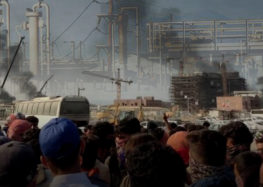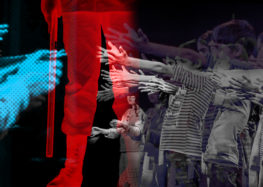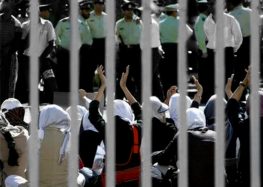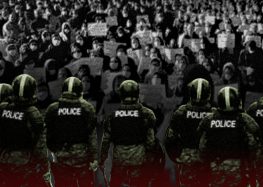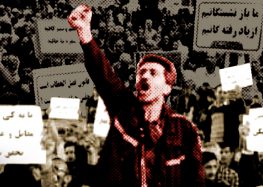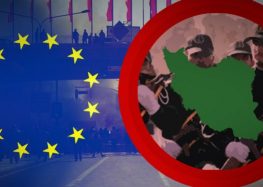Executive Summary
A Growing Crisis: The Impact of Sanctions and Regime Policies on Iranians’ Economic and Social Rights
Executive Summary
Despite the international community’s stated intention to direct sanctions at the government of Iran for its nuclear program, and the Iranian government’s claim that it is successfully instituting a resistance economy, Western sanctions and regime policies are combining to bring about a severe deterioration in the ability of the Iranian people to pursue their economic and social rights. In fact, there is a growing crisis in Iran: Iranians, especially those from the lower and middle echelons of society, are increasingly unable to maintain access to such basic rights as a balanced diet, medicine, employment, education, and healthcare.
This study by the International Campaign for Human Rights in Iran details the costs borne by the Iranian people as a combined result of the international sanctions imposed on the Islamic Republic and the economic policies instituted by the government of Iran. Drawing on a review of scholarly material and journalistic accounts, as well as extensive interviews with a cross-section of Iranians, the study seeks to show that sanctions and regime policies are now preventing many Iranians from meeting their basic economic needs.
Prior to 2012, sanctions were not a significant contributor to economic hardship in Iran. Throughout the 1979-2011 period, the effect of international sanctions against Iran was limited as sanctions during this period were unilaterally imposed by the US, and other countries were able to fill the void in trade and business transactions with Iran, even if at a slightly higher cost to the Islamic Republic.
Rather, harmful economic policies undertaken by successive governments of the Islamic Republic during this period far outweighed the impact of any sanctions in terms of economic costs to the country. Under the post-revolutionary leaderships of Ayatollah Khomeini (1979-1989), Hashemi Rafsanjani (1989-1997), Mohammad Khatami (1997-2005), and Mahmoud Ahmadinejad (2005-present), economic policies produced—and perpetuated—an Iranian economy marked by state-domination, oil-dependency, inefficiency, and corruption. The result was high unemployment, inflation, brain drain, and anemic economic growth rates. However, exceptionally high oil prices during the last decade allowed the Iranian government to compensate for—and mask—economic costs that were associated either with government policies or sanctions, thereby mitigating the economic harm to the Iranian population.
This changed significantly with the implementation of multilateral sanctions in 2012, which targeted all sectors of the Iranian economy and took direct aim at Iran’s principle source of revenue, its oil sector. The comprehensive and stringent nature of these sanctions has affected all trade with the Islamic Republic, rendering even the movement of goods that are explicitly exempt from sanctions difficult. When combined with the dysfunctional economic policies of the Iranian government—particularly those enacted under the administration of Ahmadinejad, which exacerbated inflation and unemployment in the country and left the import- and oil-dependent Iranian economy deeply vulnerable to the impact of the 2012 sanctions—the economic costs of the sanctions to the Iranian population became severe. Moreover, continued regime mismanagement—which reflects either willful exacerbation of the sanctions’ effects for political gain or managerial incompetence—has worsened the economic difficulties of many in Iran; for example, the Iranian government’s under-allocation of resources for the import of critical items such as medicines has produced a crisis for many Iranians.
Sanctions and regime policies have thus combined to debilitating effect. Moving any goods into or out of the country has become prohibitively expensive due to substantially increased transaction and operating costs arising from the sanctions’ banking, financial, and insurance prohibitions. Critically, this includes foods, medicines, and other humanitarian items—either because the payment channels have been cut off as a result of the banking prohibitions, or because firms have become reluctant to do business with the Islamic Republic for fear of running afoul of the sanctions. As a result, it has become difficult for the country to maintain the requisite level of essential imports, which include not only foods and medicines, but the inputs and raw materials that Iran’s industries depend upon as well.
Meanwhile, the sanctions have halved Iran’s oil revenues. This has contributed significantly to the precipitous decline in the value of the rial. With its foreign exchange earnings halved and unable to transfer its oil earnings back to Iran, the Iranian government has found it difficult to supply the requisite funds to support its currency. As a result, inflation has sharply increased, to at least 50 percent by some estimates, and higher in some sectors. The standard of living of all wage earners has plummeted and a rising number of unemployed individuals and their families living in the country’s urban centers are being pushed into poverty and malnutrition.
The decline in the nation’s manufacturing sector, and, with it, the condition of Iran’s roughly 15 million workers and their dependents, has been particularly pronounced. The sanctions have reduced access to and substantially raised the cost of the hard currency that manufacturers require for the purchase of indispensable inputs, raw materials, spare parts, machinery, and capital goods. At the same time, by imposing restrictions on and increasing financial, transportation, and insurance costs, sanctions have increased operating costs.
Since 2012, the number of bankruptcies, layoffs, and plant closures has substantially increased. The rapid depletion of the country’s foreign currency reserves will increasingly choke off the capital goods and inputs that Iran’s industrial sector requires in order to sustain operations. This will result in the closure of more plants and operations, and the impoverishment of ever-larger segments of the working population. Indeed, some two-thirds of the nation’s manufacturing units are on the verge of closure, and employed workers are now being paid in an irregular and infrequent manner. Millions of Iranians from the lower and middle echelons of society are struggling to meet the rising costs of rent and food; the growing ranks of the unemployed now face dispossession and hunger.
The crisis in the country’s healthcare system has become particularly severe. Iran is critically dependent on imports in this sector: its stock of medical equipment is almost entirely imported, and its pharmaceutical industry depends on imports for 80 percent of the raw materials they utilize to manufacture their products. Advanced drugs used to treat life-threatening diseases (which afflict some six million Iranians) are all imported. Yet due to the banking sanctions and Iran’s expulsion from SWIFT, there are no viable channels to make payments to Western suppliers.
The Iranian government has greatly exacerbated the situation by not allocating the requisite hard currency to the medical sector. As a result, there are acute shortfalls in medicines and equipment, and long delays in transporting medicine to Iran. The most vital drugs for cancer and other severe diseases are now unavailable. Shortages, and the devaluation of the rial, have produced a 350 percent inflation rate in medical costs, making what is available increasingly out of reach for most Iranians.
The nutritional value and balance of the consumption basket of the majority of Iranians has also plummeted. The nation is dependent on imports for about a quarter of its food requirements. With the plunge in the value of the Iranian currency, the rise in the cost of imports, and the growing ranks of the unemployed, increasing numbers of Iranians are no longer able to afford meat, poultry, fruits, vegetables, and dairy, relying instead on a diet largely comprised of carbohydrates.
Significant increases in the rate of poverty, hunger, and malnutrition engender other negative repercussions, especially for women and children. The most pernicious of these are the withdrawal of children from schools and child labor, with the brunt of these practices being borne by young girls. Women are more likely to lose their jobs, and economic and social dislocations may well lead to increased domestic violence.
The International Campaign for Human Rights in Iran calls on all parties to reassess their policies in light of the economic harm being inflicted upon the Iranian people. The government of Iran should end the needless policies that only worsen the crisis in access to medicines, foods, and other essential imports. The international community must recognize the growing crisis in Iran and recalibrate the current sanction regime. Sanctions were implemented to raise the cost to the government of Iran of its noncompliance with UN Security Council resolutions on the country’s nuclear program. Yet the Iranian people, who bear no responsibility for the policies undertaken by the government, have increasingly come to bear the cost of the sanctions. Accordingly, this study offers specific policy recommendations to the Iranian government, the US and EU governments, the UN, and relevant private sector companies, aimed at instituting a more effective domestic policy environment in Iran and a more effectively targeted sanctions regime that imposes costs on the Iranian government, not the Iranian people.


